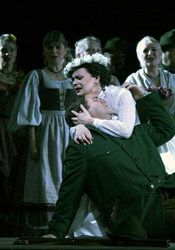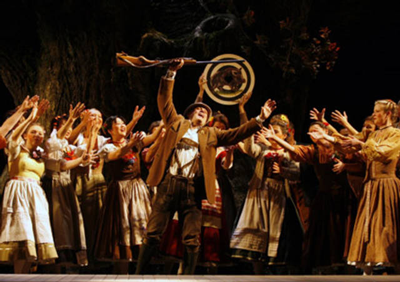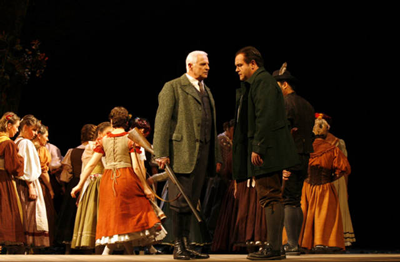24 Oct 2007
Der Freischütz at Oper Köln
Do you remember a moment when a piece, new to you, so engaged you that you immediately wanted to know more. . .or all about it?

Do you remember a moment when a piece, new to you, so engaged you that you immediately wanted to know more. . .or all about it?
I can recall, as a student, hearing a guest concert by the Bavarian Radio Symphony in Chicago’s Orchestra Hall that opened with Carlos Kleiber leading a thrilling reading of the overture to Weber’s “Der Freischütz.” (Every chestnut was once new to those who hadn’t heard it before, right?)
After this “teaser,” I discovered that the whole opera was not only under-represented on recordings at the time, but also that in America it was hardly ever seen at all, remaining more talked about than performed. The reason for the neglect of this “first German opera” is perhaps partly because of extended dialogue scenes which have trouble making their effect in cavernous theatres; partly because of a pervading mysticism that can seem rather silly today (except maybe to adherents of L. Ron Hubbard); and the notoriously difficult staging demands needed to credibly bring off the rather clunky dramaturgy of the “Wolf’s Crag” scene (which can so easily become so very cheesy).
More’s the pity that it is so rarely attempted, because I find much of the music sublime, that is, if you have the singers to meet its challenges. And therein perhaps lies the real reason for its neglect, since there are certainly other pieces that are dialogue heavy and dramatically “challenging” that get regular mountings (“Die Zauberflöte” comes to mind). Weber’s opus not only requires a hero and heroine with sizable, flexible heroic voices, but a bass-baritone with chords of steel. All are called upon to maintain a mounting and plausible tension in the plentiful dialogue.
Happily, in Germany, “Freischütz” is attempted much more often, though still not nearly with the frequency of other mainstream masterpieces. In my experience the two separate Frankfurt productions (one memorable only for a terrific Angela Denoke, the other for the goofiness of having the hunters got-up as Hassidic Jews); the Achim Freyer version in Stuttgart (which others liked much more than I); and even a well-meant staging in Seattle with (a slightly mis-cast) Deborah Voigt; all left me admiring individual components but none adding up to a total package. Until now.

Cologne Opera has unveiled a new staging under the sure direction of Michael Heinicke, with a pleasing traditional set and costume design by Jens Kilian, all quite beautifully lit by Hans Toelstede. Just when you thought you may never see the like again, here is a “take” with - *gasp* - actual pretty dirndls and proper-looking hunters, and a huge, gorgeous, many-branched tree that fills the stage. In the first flush of fall, its leaves just turning, and beautifully lit, it elicited gasps at curtain rise. “Agathe’s” room was a skeletal “wall” frame of 4 X 4's, sparsely furnished, through which the ever-present tree kept nature smack at the center of things.
Mr. Heinicke is an unfussy director who, blessedly, does not seem to need to impose much of anything but common sense and strong stage pictures onto the piece. Almost everything and everybody is what or who they are supposed to be. He has elicited sincere and affecting performances from an excellent cast. However, perhaps out of obligation to do something “modern,” there are one or two moments when “Freischütz” misfires.
Just after Max loses the initial shooting contest, the taunting chorus is suddenly joined by a sextet of actual pit musicians, playing onstage in their concert attire, who join in tormenting him. Too, there is a piece of business in which “Agathe” pretends to play a cello as accompaniment to “Ännchen’s” aria. She is so clearly not playing it that it only distracts. And, in a “what-does-that-mean?” moment, “Ännchen” places the flower arrangement on the lip of the stage mid-Act I, next to the prompter’s box, where it remains until picked up again when the flowers are required in Act II. I would hope that some consideration would be given to tweaking these jarring bits, because for the rest of the evening I thought the staging had most everything one could want.
The acting was not only believable, but for once the declamation was not of the phoney- baloney Dudley Do-Right School of Operatic Elocution. “Samiel” (Joachim Berger) was a looming and evil omni-presence who eerily appeared up in the crook of the tree, evaporated into the darkened background at will, and attempted complete control over the turns-of-events, including a sinister hovering during “Agathe’s” second act aria. The “Hermit” (Wilfried Staber) too had several silent and mysterious appearances long in advance of his usual sung entrance late in Act II.
The fine young Croatian baritone Miljenko Turk (wonderful as “Billy Budd” last season) brought beauty of tone and attractive demeanor to “Ottokar.” Katharin Leyhe’s “Ännchen” was not just the usual chirpy kewpie doll, but had a tall, solid physique du role and brought some welcome starch to her characterization, producing some lovely lyric singing in the bargain. Venerable bass Ulrich Hielscher made a perfect fatherly “Kuno.” He was also feted at curtain call for his 30 years service with the company, by being made a “Kammersaenger.”

Lithuanian soprano Ausrine Stundyte had just the right amount of heft and metal in her pleasing sound to make a winning Agathe. The hushed “Leise, leise” was beautifully internalized, and the soaring stretto section delivered all the goods. She was totally committed to the Nervous Nellie characterization that was asked of her. Indeed, I thought she was going to have a nervous breakdown in several moments -- at least I hope she was acting! (It was reminiscent of Judy in her later years. . .)
Thomas Mohr was a splendid Max. While his firm lower-voiced singing displays some signs of his former life as a baritone, the top rings true, his sense of line is commendable, his dramatic commitment is effectively varied, and he poured out beautiful sound all night long in all registers. We may have gotten spoiled, wishing every leading tenor could look like Juan Diego Florez or William Burden, and that Mr. Mohr does not. But he exuded a genuine, conflicted appeal nonetheless, albeit more in the Paul Giamatti mode.
The knockout performance this night came from the completely mesmerizing, thrillingly sung “Kaspar” of Korean bass Samuel Yuon. His focused, steely tone cut through the orchestra with ease, and his fiery melismatic work was right on the money. Moreover, he avoided every cliche that has encumbered this role in the past with acting of amazing nuance. Even the sometimes hokey asides of “Hilft, Samiel” hit their mark. His star turn in the “Wolf’s Crag” conjuring scene was awesome. I should add that he was ably abetted by some very good, strobe-like lighting effects which made the static tree actually seem to move about.

Memory having the ennobling effect that it does, I suppose nothing will ever completely over-ride my first happy encounter with the opera’s overture those many years ago. But I found Enrico Delamboye’s conducting to be very well-considered overall. He favored faster tempi than some, with the bridesmaid’s tune and a couple of the choruses especially quick-paced. There was a brief scrappy moment or two, like the opening bars of the overture’s first agitato and a slight hiccup in the opening chorus. But even in the relatively dry acoustic of the Cologne house, the Guerzenich Orchestra, chorus and cast responded to him with often expansive, always persuasive Romantic music-making of a very high order.
If you, too, have longed for an encounter with the best of all possible performances of “Der Freischütz,” well, this could very likely be the one you’ve been waiting for.
James Sohre